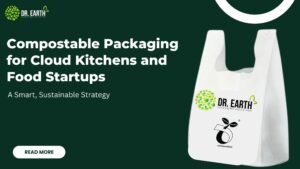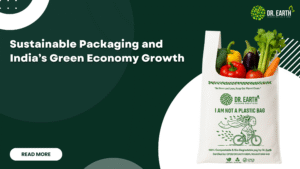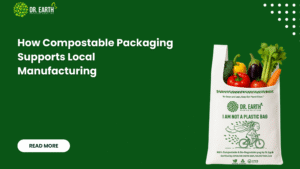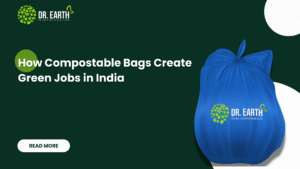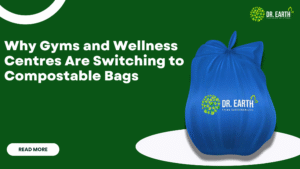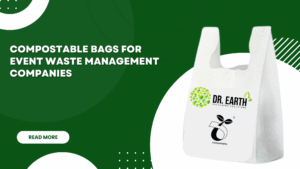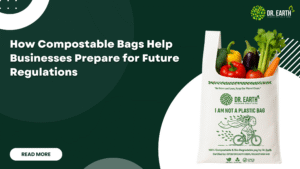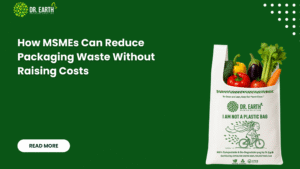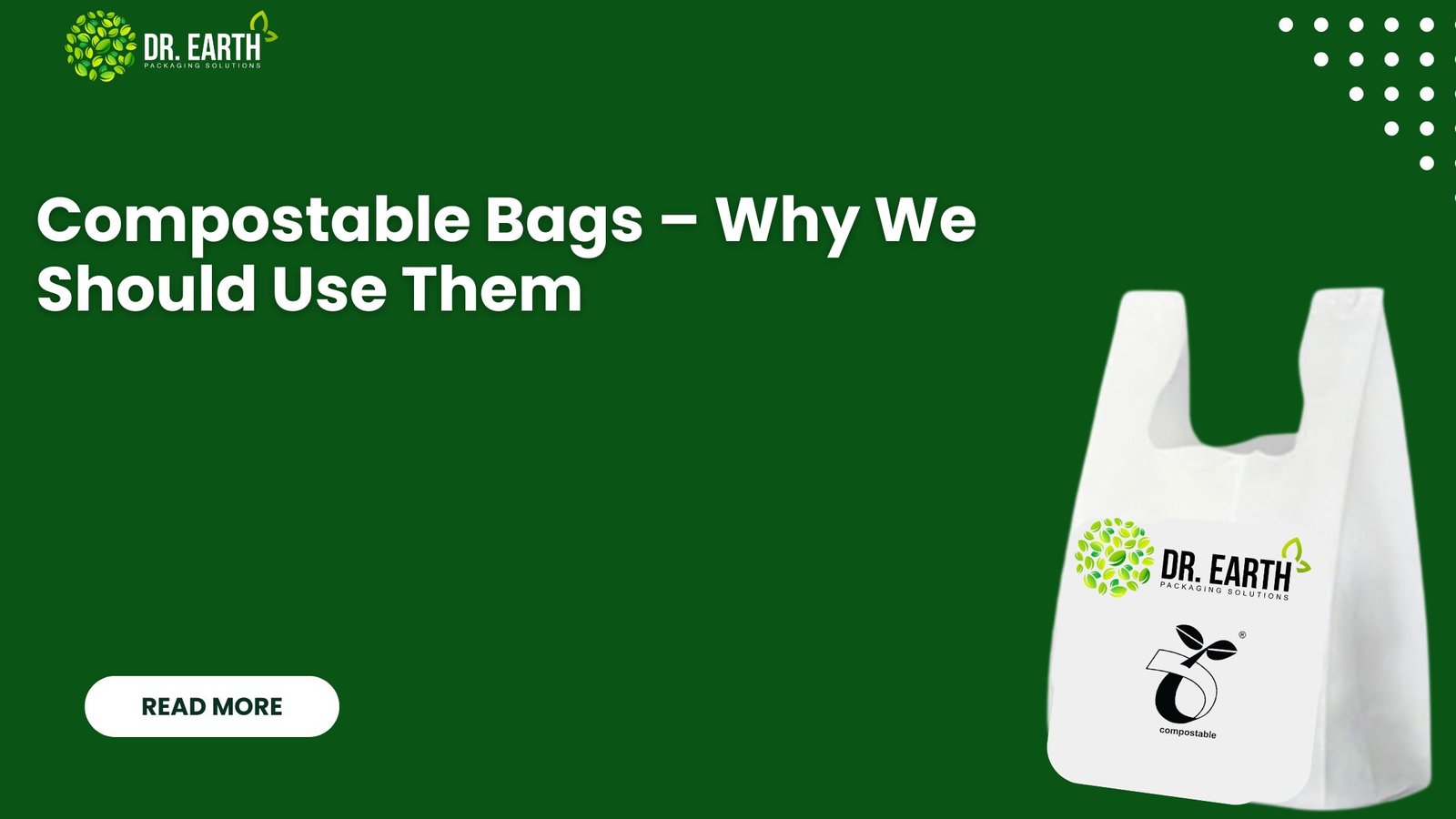
Today, the need for environmental sustainability exceeds the category of choice because it stands as an inevitable requirement. The extensive decomposition time of about hundreds of years makes plastic waste the main cause of pollution alongside environmental destruction. The environmental crisis demands sustainable solutions and compostable bags emerged as an effective alternative to help combat this need. Dr. Earth works as a sustainability-focused company through its development of superior-quality compostable bags that replace regular plastic alternatives. Compostable bags provide essential reasons for community adoption. The blog examines the positive features, practical uses and environmental effects of compostable bags on Earth.
Understanding Compostable Bags
Organic substances, including cornstarch with PLA (polylactic acid) and PBAT (polybutyrate adipate terephthalate), make the material composition of compostable bags. The natural elements of traditional plastic bags drive them to break down but compostable bags decompose into natural components when composted properly in a few months. The correct decomposition process of these bags creates soil enrichment in addition to their biodegradable properties.
The Environmental Impact of Plastic Bags
Today, plastic pollution stands among the most troublesome environmental problems that affect our world. Evidence shows that the yearly production of 300 million tons of plastic results in major amounts that fill landfills and oceans. The consequences of plastic waste generation entail:
- Harm to Wildlife: The ingestion of plastic debris by marine life as well as animals ends in fatal outcomes.
- Soil and Water Contamination: Materials from plastic degradation discharge poisonous substances that pollute both water reservoirs and ground soil.
- Greenhouse Gas Emissions: The production process together with disposal operations generate greenhouse gases, which result in climate change effects.
- Microplastic Pollution: The food chain receives microplastic particles that create health risks for animals together with humans.
- Inefficient Waste Management: Inefficient waste management practices because plastic bags cause drainage systems to become blocked, which creates urban flooding problems that endanger the environment.
Benefits of Compostable Bags
Many advantages result from adopting compostable bags into waste management practices.
- Eco-Friendly Decomposition: The decomposition process of these bags occurs by natural means without creating any toxic remains.
- Reduces Landfill Waste: The breakdown time of these bags prevents waste from reaching substantial levels in garbage dumps.
- Lower Carbon Footprint: Environmentally-friendly carbon dioxide emissions during compostable bag manufacturing remain lower than those of standard plastic bags.
- Non-Toxic and Safe: The manufacturing materials of compostable bags contain natural elements that produce safe results in environmental conditions compared to toxic plastic bags.
- Supports a Circular Economy: A circular economy finds support through compostable bags because these materials convert into nutritious compost usable for agricultural purposes.
- Less Dependence on Fossil Fuels: Renewable resources form the base of compostable bags instead of petroleum, which is used to produce traditional plastic bags.
- Improves Soil Health: The decomposition process of compostable bags creates advantageous soil-enhancing nutrients that stimulate soil fertility.
- Encourages responsible consumption: Environmental awareness improves among consumers who select compostable materials for their consumption endeavors.
How Dr Earth’s Compostable Bags Stand Out
The company Dr. Earth leads sustainable packaging development by manufacturing premium-quality compostable bags that satisfy diverse requirements in the market. Their bags are:
- Certified Compostable: Meeting global compostability standards.
- Durable and Versatile: These bags demonstrate excellent durability because they work well for shopping groceries alongside food packaging and waste disposal needs.
- Affordable and Accessible: The solution combines accessibility with affordability to offer customers an eco-friendly package click.
- Customizable: These bags are customizable because they exist in various dimensions together with design options specifically tailored for different requirements.
- Designed for Maximum Efficiency: The product achieves peak efficiency through its design method which balances strength with quick decomposition properties.
Practical Uses of Compostable Bags
People can use compostable bags in various situations to perform duties that plastic bags would normally handle.
- Grocery Shopping: The lightweight style of these bags remains an optimal choice when you require fresh produce combined with your regular store items.
- Waste Management: The Industrial Role of Waste Management Utilizes This Product to Gather Kitchen Waste and Organic Substances for Creating Compost.
- Retail and Packaging: The retail sector and packaging industry benefit from these bags through sustainable packaging that results in diminished carbon emissions.
- Hospitality Industry: The hospitality sector, comprising hotels and restaurants, should replace its current plastic provisions with compostable products instead.
- Agriculture: Agricultural producers maintain environmental protection through compostable bags that let them store organic contents.
- Event Planning: Organized events can select compostable bags for waste management collections while using them for packaging items.
- E-Commerce Packaging: Compostable shipping bags in e-commerce packaging systems offer online retailers an opportunity to reduce their plastic waste.
The Role of Consumers in Promoting Sustainability
The public drives the market for sustainable product selection through their purchasing choices. Using compostable bags allows people to join the movement of building a more sustainable planet. Consumers need to follow these steps to create positive change:
- Adopt Sustainable Practices: People should choose compostable daily bags as their sustainable practice.
- Educate Others: People should learn about the sustainable benefits that compostable alternatives provide.
- Support Sustainable Brands: Customers should select brands like Dr. Earth since these brands demonstrate sustained focus on environmental responsibility.
- Proper Disposal: Compostable bags should meet proper disposal requirements through composting facilities because it enables their environmental advantages.
- Demand Policy Changes: The implementation of compostable bags should be promoted through government policies that ban single-use plastic products.
Overcoming Challenges in Compostable Bag Adoption
Serious obstacles exist that make it challenging to promote widespread adoption of compostable bags.
- Lack of Awareness: The majority of customers remain uninformed about what compostable bags offer them.
- Higher Initial Costs: Although compostable bags initially cost more than plastic bags do, the future environmental advantages of this item provide high value for the initial investment.
- Limited Composting Facilities: Industrial composting facilities remain scarce across certain areas because these regions lack proper facilities to correctly dispose of these products.
- Misconceptions About Durability: Consumer misunderstandings about durability lead them to doubt compostable bag strength but new technological advancements have improved these products.
- Regulatory Barriers: Bothered areas lack official guidelines that encourage the usage of compostable options.
Future of Compostable Bags
Future economic demand for compostable plastic items shrinks as numerous national governments adopt laws banning standard plastic products. New material science discoveries enhance the durability characteristics and lower the costs of compostable products available today. The organization persistently promotes environmentally-friendly products to reach every segment of society for the establishment of an eco-friendly future.
Conclusion
Compostable bags present an effective solution to combat plastic pollution and promote sustainability. Companies like Dr. Earth are leading the way by providing high-quality compostable alternatives that help individuals and businesses make environmentally responsible choices. By making the switch, we can all contribute to a cleaner, healthier planet.
FAQs
Q- 1. Are compostable bags the same as biodegradable bags?
Ans- Biodegradable bags will eventually dissolve but create toxic while compostable bags transform completely into natural parts of the environment.
Q- 2. Can compostable bags be thrown in regular trash bins?
Ans- The proper disposal location for compostable bags is a professional composting facility since this ensures complete decomposition.
Q- 3. How long does it take for compostable bags to break down?
Ans- Composting facilities help compostable bags reach complete decomposition levels within a time span of 3-6 months under perfect conditions.
Q- 4. Are compostable bags strong enough for daily use?
Ans- Dr Earth’s compostable bags present a durable structure that enables efficient everyday use.
Q- 5. Where can I buy Dr Earth’s compostable bags?
Ans- The website Dr. Earth serves as the official platform for buying their compostable bag products.
Share:
Related Posts
